PIA vs Cyberghost
Contents
Compare ratings
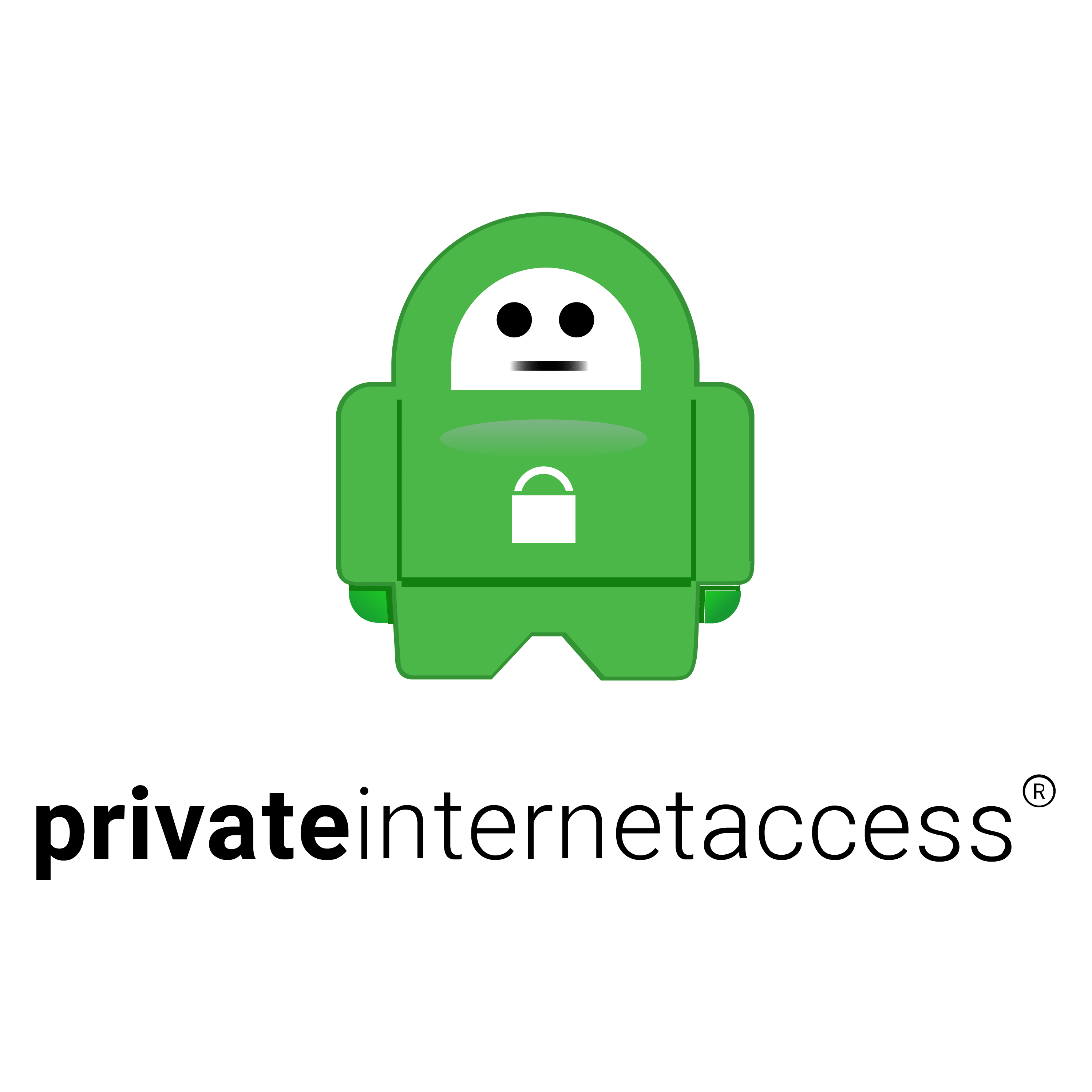

Reviews by experts

Private Internet Access (PIA) is a premium VPN service based in the US that focuses on being simple and easy to use for a target consumer market. Its primary selling features are its no-logging policy and claimed fast network speeds. In addition, it offers subscribers unlimited bandwidth using superfast servers, and the company claims never to throttle speeds. There are currently no data retention laws for services based in the US, unlike other regions such as Europe. Combined with the no-logging policy, this means that, in theory, user privacy should be guaranteed.
The VPN service is implemented using open-source protocols to provide transparency of the integrity of its service to users. Primarily the service can be configured to use OpenVPN or WireGuard, offering the latest and more secure protocols. The VPN service for iOS devices uses IPsec (IKEv2) by default. Subscriptions can be taken out monthly, annually, or on a two-year subscription. The latter offering the best value for money over the long term, currently including an additional two free months. The cost of the basic service compares favorably with other popular premium VPN service providers.
A nice feature is that one subscription covers the simultaneous use of up to ten different devices, making it ideal as a solution for the whole family.
The VPN apps support the most popular devices and platforms, including Windows, macOS, Linux, Android, and iOS. There are also browser extensions available for Chrome, Firefox, and Opera. The VPN apps can be configured quickly and easily, though they were found to offer the most secure operation possible by default. A good feature was the ability to set up devices to automatically use a VPN for all connections via insecure open WiFi connections and to disable the VPN for any connections using a secure WiFi connection. This feature offers automatic security protection for mobile devices when they need it and the best connection speed possible when this additional security is unnecessary.
The PIA VPN service includes an automatic Kill Switch to prevent any data leakage should the VPN connection drop out during use. The PIA service also uses its own DNS servers to avoid possible DNS leaks. These features provide users with high levels of privacy. Accessibility to streaming services such as Netflix and BBC iPlayer are generally suitable for users looking for legitimate access to these services while maintaining browsing history privacy. The PIA VPN service terms of use do not permit the downloading and sharing of illegal material. Where streaming services apply preemptive blocks for VPN services, PIA operates servers that implement port forwarding to bypass such blocks if necessary.

CyberGhost is a premium VPN service based within the European Union in Bucharest, Romania. It claims to offer the 'Fastest VPN Available on the Market' with its use of the WireGuard protocol. Users have the option to use the OpenVPN or IKEv2/IPsec protocols. It offers servers that are optimized for media streaming, torrenting, or maximum download speed. The iOS user interface includes a list of the streaming optimized servers, displaying a summary of which server is recommended for which streaming service.
Its main selling features are its claimed high speeds and no-logging policy. It offers subscribers unlimited bandwidth for up to seven simultaneously connected devices, and the company claims never to throttle speeds.
While the service provider is within the EU and subject to GDPR, the local data protection laws do not currently require data logging and retention. It claims that it does not collect connection logs or traffic data, so user privacy should be guaranteed while using the service.
Side-by-Side Comparison
- Pricing
- Monthly
- $9.95
- Yearly
- $39.95 (equivalent to $3.33 per month)
- Three yearly
- $79 (equivalent to $2.19 per month)
- Payment Methods
- Parallel Connections
- 10
- Server Locations
- 75+ Countries
- Jurisdiction
- United States of America
- Protocols
- OpenVPNWireGuardIPsec (IKEv2) on iOS
- Encryption
- AES 128 CBC/GCMAES 256 CBC/GCMHandskaing SHA96/SHA160/SHA256
- Speeds
Private Internet Access VPN Server Locations Download Upload United Kingdom 173.79 Mbit 87.37 Mbit Australia 240.41 Mbit 20.21 Mbit China 340.28 Mbit 1.4 Mbit South Africa 16.38 Mbit 35.44 Mbit California, USA 316.32 Mbit 14.23 Mbit New York, USA 147.4 Mbit 25.34 Mbit Germany 79.82 Mbit 149.91 Mbit Taiwan 167.48 Mbit 0.94 Mbit Spain 82.95 Mbit 122.37 Mbit Brazil 130.67 Mbit 30.3 Mbit
- Monthly
- $12.99
- Half yearly
- $38.34 (equivalent to $6.39 per month)
- Two Yearly
- $58.50 (equivalent to $2.25 per month)
- Payment Methods
- Parallel Connections
- 7
- Server Locations
- 91 Countries
- Jurisdiction
- Romania (EU)
- Protocols
- IPsec (IKEv2)OpenVPNWireGuard
- Encryption
- AES 256
- Speeds
CyberGhost VPN Server Locations Download Upload United Kingdom 110.13 Mbit 60.27 Mbit Australia 23.24 Mbit 11.69 Mbit Taiwan 217.49 Mbit 13.91 Mbit South Africa 38.26 Mbit 8.36 Mbit California, USA 222.27 Mbit 11.74 Mbit New York, USA 94.86 Mbit 25.83 Mbit Germany 246.1 Mbit 62.73 Mbit Spain 242.2 Mbit 131.09 Mbit Brazil 73.23 Mbit 8.3 Mbit Philippines 201.78 Mbit 7.3 Mbit
-
Pricing
- VPNS
- Private Internet AccessCyberGhost
- Pricing
- Monthly
- $9.95
- Yearly
- $39.95 (equivalent to $3.33 per month)
- Three yearly
- $79 (equivalent to $2.19 per month)
- Monthly
- $12.99
- Half yearly
- $38.34 (equivalent to $6.39 per month)
- Two Yearly
- $58.50 (equivalent to $2.25 per month)
- Payment Methods
- Parallel Connections
- 107
- Server Locations
- 75+ Countries91 Countries
- Jurisdiction
- United States of AmericaRomania (EU)
- Protocols
- OpenVPNWireGuardIPsec (IKEv2) on iOSIPsec (IKEv2)OpenVPNWireGuard
- Encryption
- AES 128 CBC/GCMAES 256 CBC/GCMHandskaing SHA96/SHA160/SHA256AES 256
- Speeds
Private Internet Access VPN Server Locations Download Upload United Kingdom 173.79 Mbit 87.37 Mbit Australia 240.41 Mbit 20.21 Mbit China 340.28 Mbit 1.4 Mbit South Africa 16.38 Mbit 35.44 Mbit California, USA 316.32 Mbit 14.23 Mbit New York, USA 147.4 Mbit 25.34 Mbit Germany 79.82 Mbit 149.91 Mbit Taiwan 167.48 Mbit 0.94 Mbit Spain 82.95 Mbit 122.37 Mbit Brazil 130.67 Mbit 30.3 Mbit CyberGhost VPN Server Locations Download Upload United Kingdom 110.13 Mbit 60.27 Mbit Australia 23.24 Mbit 11.69 Mbit Taiwan 217.49 Mbit 13.91 Mbit South Africa 38.26 Mbit 8.36 Mbit California, USA 222.27 Mbit 11.74 Mbit New York, USA 94.86 Mbit 25.83 Mbit Germany 246.1 Mbit 62.73 Mbit Spain 242.2 Mbit 131.09 Mbit Brazil 73.23 Mbit 8.3 Mbit Philippines 201.78 Mbit 7.3 Mbit
Comparison Review
Even though CyberGhost and PIA are both top-rated VPNs, they are widely different. Today, we will compare these two providers across different key categories, including security and privacy, speed, apps, streaming, ease of use, customer support, and pricing.
Do we have a winner? Let’s get into details!
Privacy – PIA Takes The Lead
First things first, PIA is headquartered in the US, which is not that great for privacy. On the positive side, the company provides a no-logs policy and anonymous payments by cryptocurrencies and gift cards.
CyberGhost allows for even greater peace of mind since it’s based in Romania. It’s a privacy-friendly country that is not a member of the Fourteen Eyes alliance. Similar to PIA, CyberGhost offers a no-logs policy and bitcoin payments.
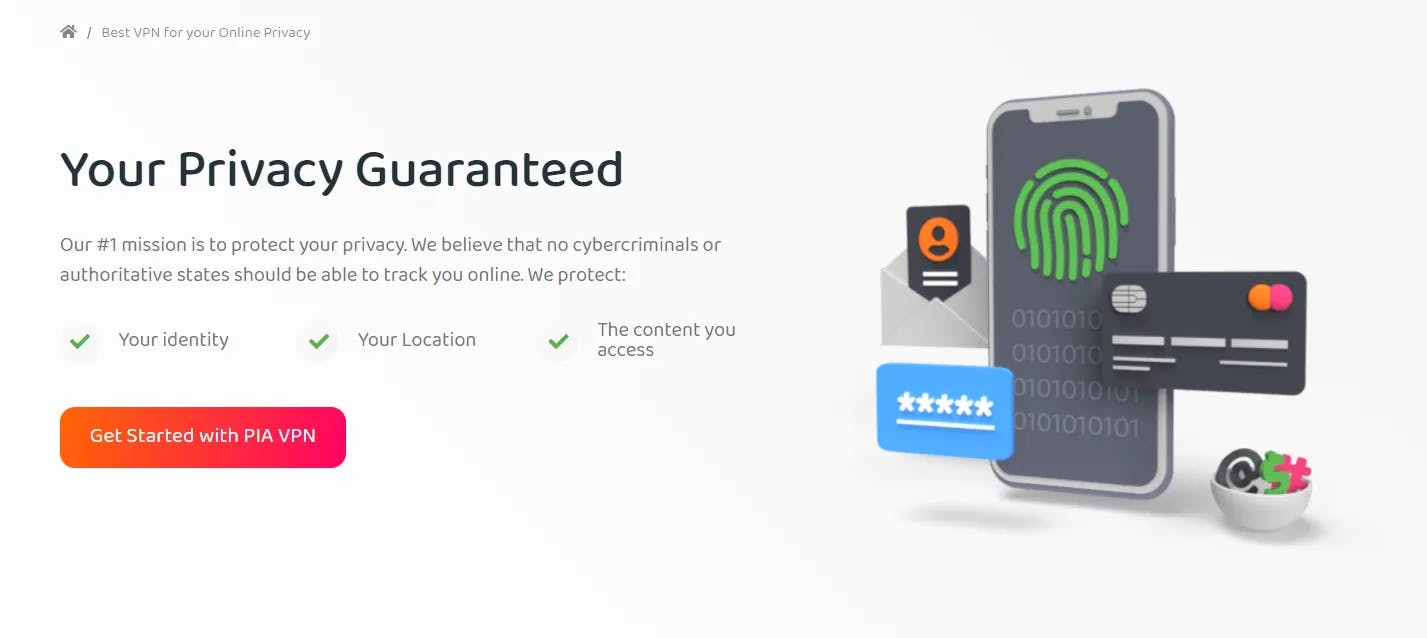
Source: https://www.privateinternetaccess.com/online-privacy
However, the owner of CyberGhost is Kape Technologies (UK), which some link to a “dark past.” In turn, PIA might be the better alternative in this regard.
Security – It’s A Tie
Both CyberGhost and PIA are serious when it comes to protecting their users. Both VPNs offer military-grade encryption, WireGuard, OpenVPN, and IKEv2 protocols. They also provide for IP, DNS, and WebRTC leak protection, along with the necessary Kill switch feature.
Furthermore, CyberGhost offers Malware Blocker, Split tunneling, SOCKS5 proxy, and Tor over VPN. In turn, PIA comes with HNS, Shadowsocks, Split tunneling, and SOCKS5 proxy.
Whichever you choose as a user, you can rest assured, you won’t be exposed.
Speed – Which VPN Is More Consistent?
CyberGhost has a well-established server network with 7,264 servers in 91 countries. PIA takes things to another level. It has 29,300 servers in 78 countries, all of which are physical P2P servers.
Still, keep in mind, more servers don’t always mean better speeds. It’s the server distribution that plays the key role. The rule of thumb is, the lower the distance to the VPN server, the lower the latency.
Now, the thing is, Private Internet Access has only a few servers in Africa, South America, and Asia. So, it’s safe to say, CyberGhost takes the lead in speed.
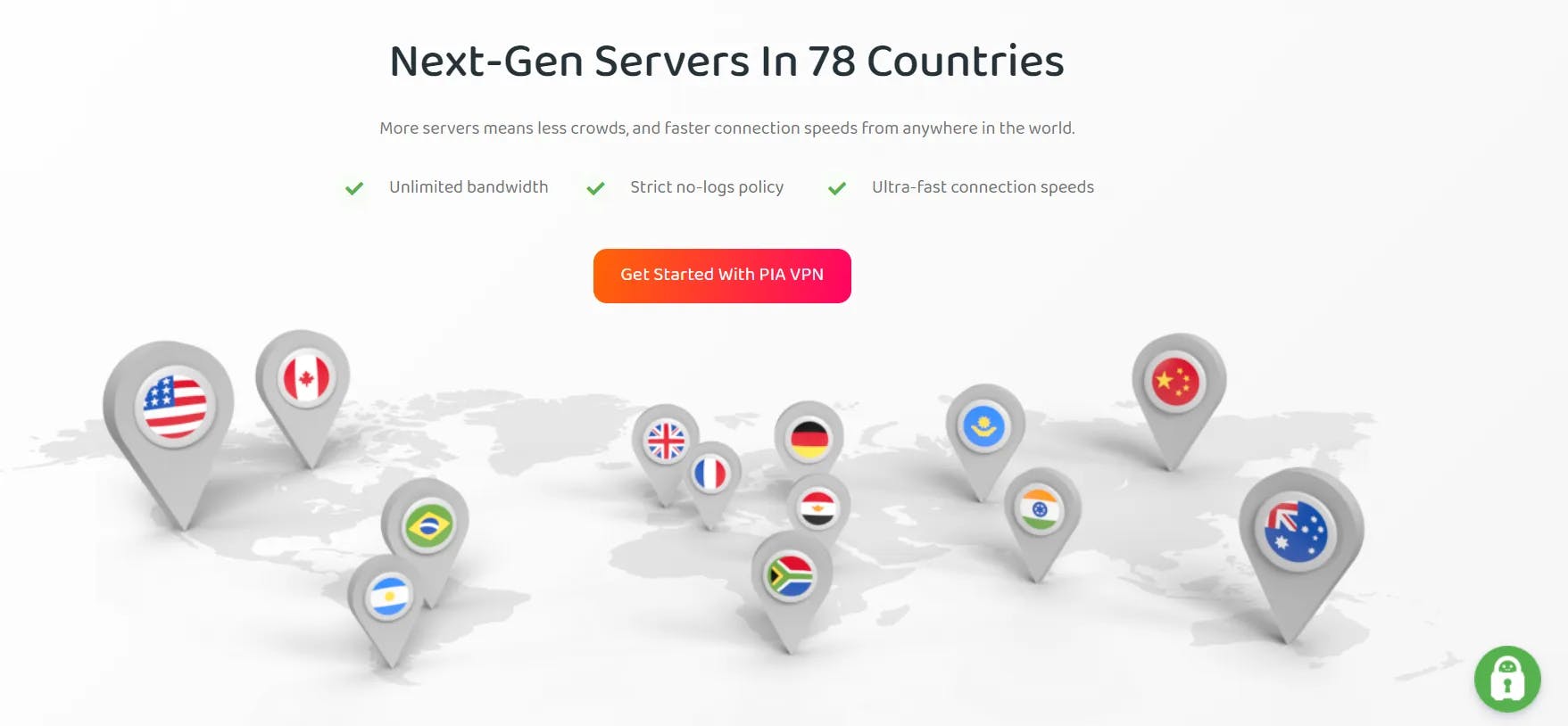
Source: https://www.privateinternetaccess.com/vpn-server
Apps and Compatibility
Both CyberGhost and PIA work with all major apps, such as Windows, macOS, Linux, Android, Apple iOS. Still, “the devil always lies in the details.”
CyberGhost offers a better app selection, including Chrome and Firefox, TV Apps, Consoles, Routers, and more. PIA, in turn, is limited to browsers only in this regard. You wouldn’t be able to set it up on your TV unless you set it up on the router first.

Source: https://www.cyberghostvpn.com/en_US/apps
There’s not a significant difference in terms of ease of use. Both VPNs provide for more or less the same setup. Even so, PIA has a slight edge in the number of simultaneous devices. You can set up to ten devices at the same time, while with CyberGhost, you can go up to seven. Still, it’s enough, even if you share the account with friends and family.
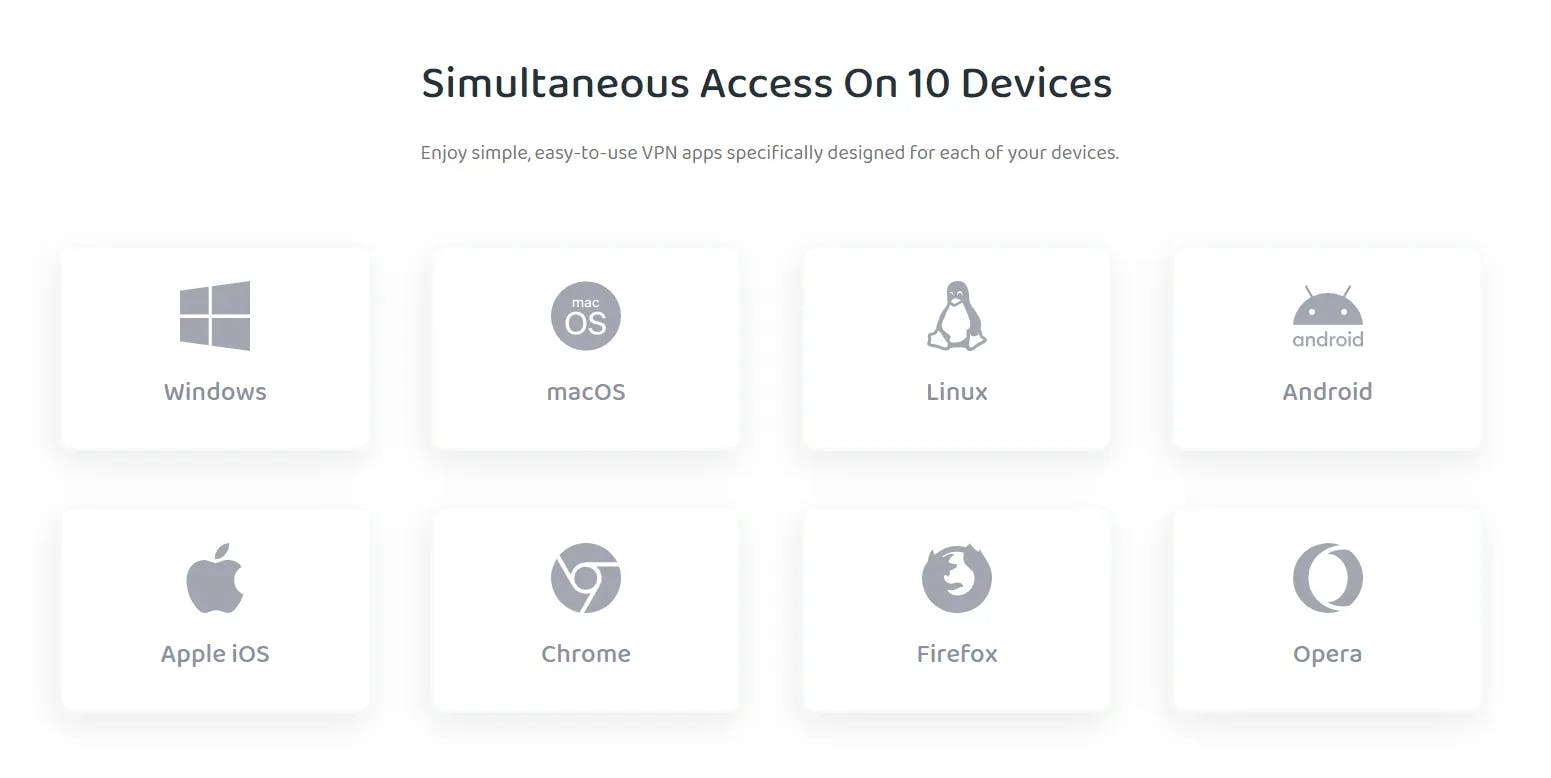
Source: https://www.privateinternetaccess.com/download
Streaming Opportunities – Who’s #1 For Netflix?
CyberGhost VPN leaves PIA way behind when it comes to streaming options. The provider comes with streaming-optimized servers for full HD videos with zero buffering for over 40 platforms, including Netflix, BBC Player, NBC, HBO Now, etc. Better yet, CyberGhost comes with a Smart DNS feature.
Private Internet Access doesn’t provide any of those, as mentioned earlier.
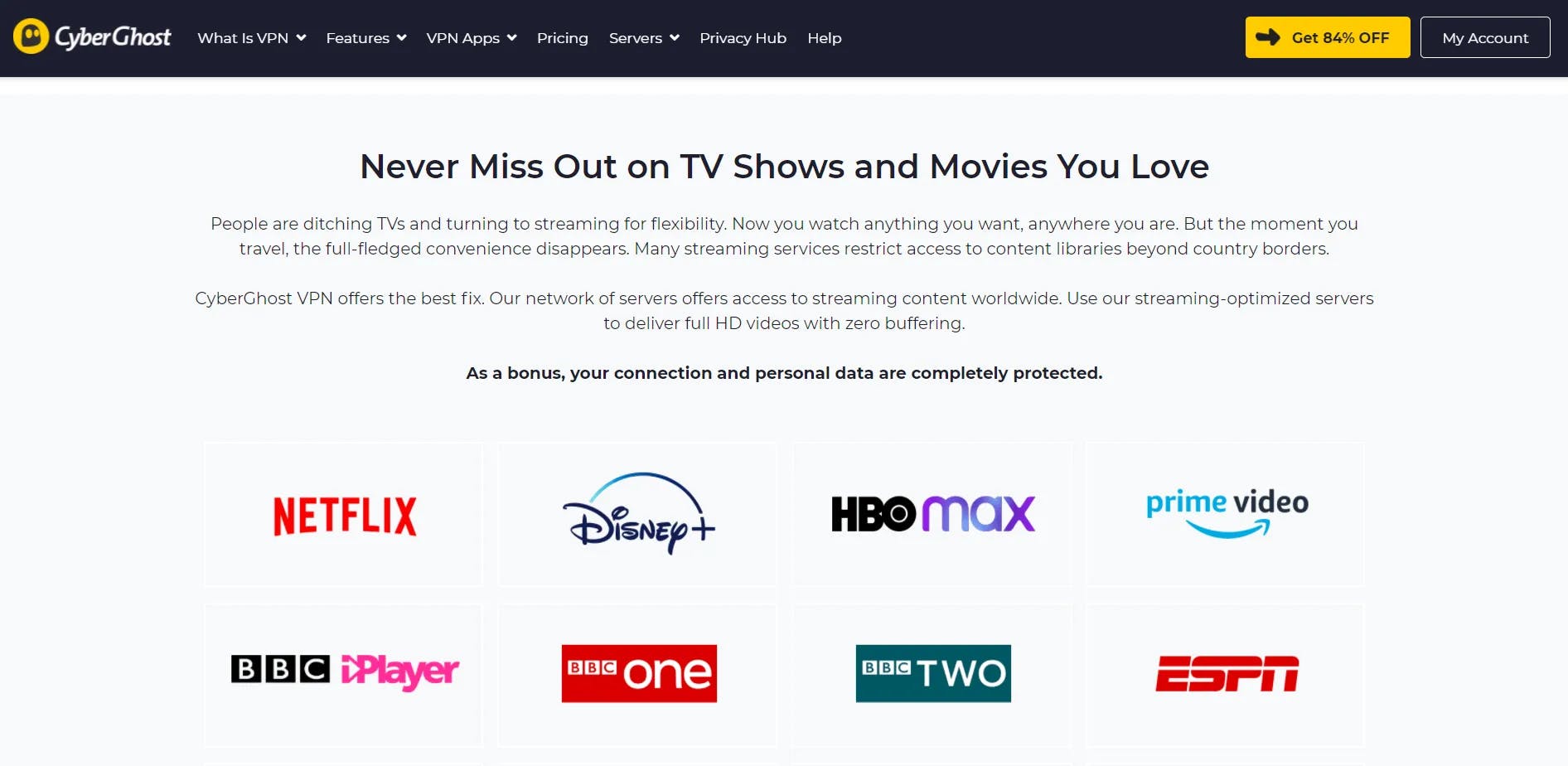
Source: https://www.cyberghostvpn.com/en_US/unblock-streaming
Customer Support – 24/7 Is A Must
CyberGhost provides 24/7 customer support via live chat and email, along with a helpful knowledge base. On the other hand, PIA lacks these qualities. The VPN allows for a ticketing system instead. Even with it, it doesn’t offer helpful responses but robotic and mostly unhelpful ones.
So, this is yet another easy win for CyberGhost VPN.
Pricing
At last, it would be best to consider pricing.
CyberGhost offers discounts on longer-term plans. It also allows for a 14-day money-back guarantee in the monthly plan and 45-day money-back guarantees for 6-month and 2-year plans.
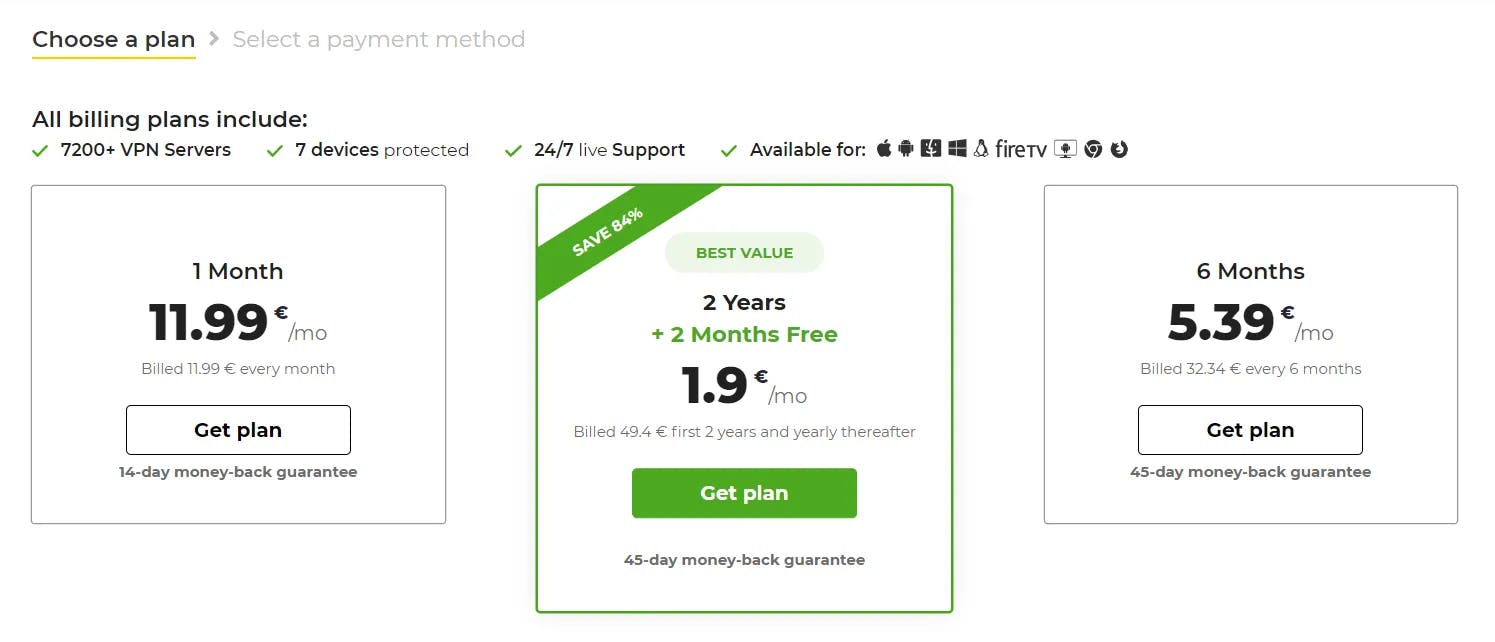
Source: https://www.cyberghostvpn.com/en_US/buy/cyberghost-vpn-2
PIA is the far more affordable alternative. Many consider it the “ultimate budget VPN.” Better yet, all of its plans are subject to a 30-day money-back guarantee.

Source: https://www.privateinternetaccess.com/buy-vpn-online
Conclusion
Who’s The Winner – Cyberghost VPN Or PIA VPN?
Both CyberGhost and PIA have a lot to offer. So, the real contest lies in what you are looking for in a VPN. More importantly, how much are you willing to pay for it? The bottom line is, CyberGhost is the more expensive alternative. However, it provides for great bonuses to justify the extra cost. Private Internet Acess (PIA) can better fit your budget and still perform better than plenty of premium providers.Who’s it going to be?

